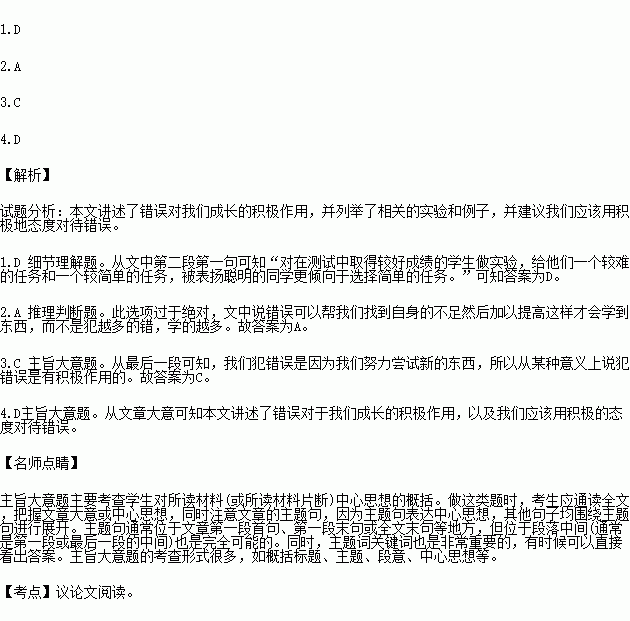题目内容
We live in a culture that sends out very mixed messages about mistakes: We're told we learn by making them, but we work hard to avoid them. So the result is that most of us know that we are going to make mistakes, but deep down, we feel we shouldn't.
Experiments with schoolchildren who did well on a given test show that those who were praised for being smart and then offered a more challenging or less challenging task afterward usually chose the easier one. On the other hand, children praised for trying hard— rather than being smart—far more often selected the more difficult task.
If we try hard to avoid mistakes, we aren't open to getting the information we need in order to do better. In a writing study, experiments showed that those who are so scared to make mistakes perform worse in writing tasks than those who aren't as worried about being perfect. They fear receiving any kind of negative feedback, so they don't learn where they went wrong and how to get better.
We don't just learn more when we're open to mistakes, we learn deeper. Research tells us that if we're only concerned about getting the right answer, we don't always learn the underlying concepts that help us truly understand whatever we're trying to figure out. Mistakes need to be seen not as a failure to learn, but as a guide to what still needs to be learned. As Thomas Edison said, “I am not discouraged, because every abandoned wrong attempt is another step forward."
Furthermore, we often make mistakes because we try new things—we wander away from accepted paths. Teflon, penicillin—these are examples of great discoveries made by mistake. Take a page from Albert Einstein, who said, "Anyone who has never made a mistake has never tried anything new. "
1. What will happen to students praised for being smart in face of choosing tasks compared to students praised for working hard?
A. He will ask his teachers for advice.
B. He will hide his mistakes from his teachers.
C. He will work harder to avoid mistakes.
D. He will choose a less challenging task.
2.Which of the following statements is NOT acceptable according to the passage?
A. The more mistakes we make, the more we learn.
B. Mistakes can be used as a positive factor for success.
C. Being open to mistakes help you understand the truth.
D. A step forward may come from mistakes you've made.
3. What does the last paragraph want to tell us?
A. One must follow a correct path to avoid mistakes.
B. To become an Einstein, you should make mistakes.
C. Making mistakes is not a disadvantage in a way.
D. You can't make mistakes unless you try new things.
4. What's the main idea of the passage?
A. We can never avoid making mistakes when we work.
B. Success can't be achieved without making mistakes.
C. Try every means to avoid mistakes in our daily life.
D. Mistakes should be treated with a correct attitude.

